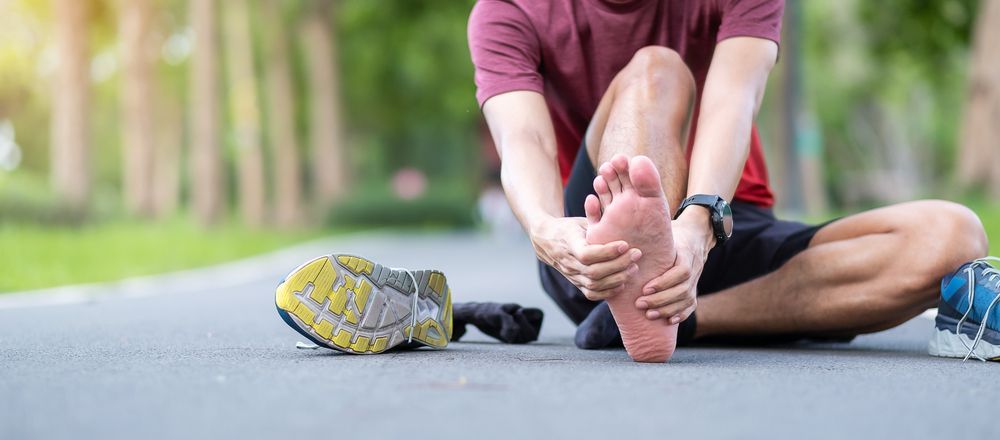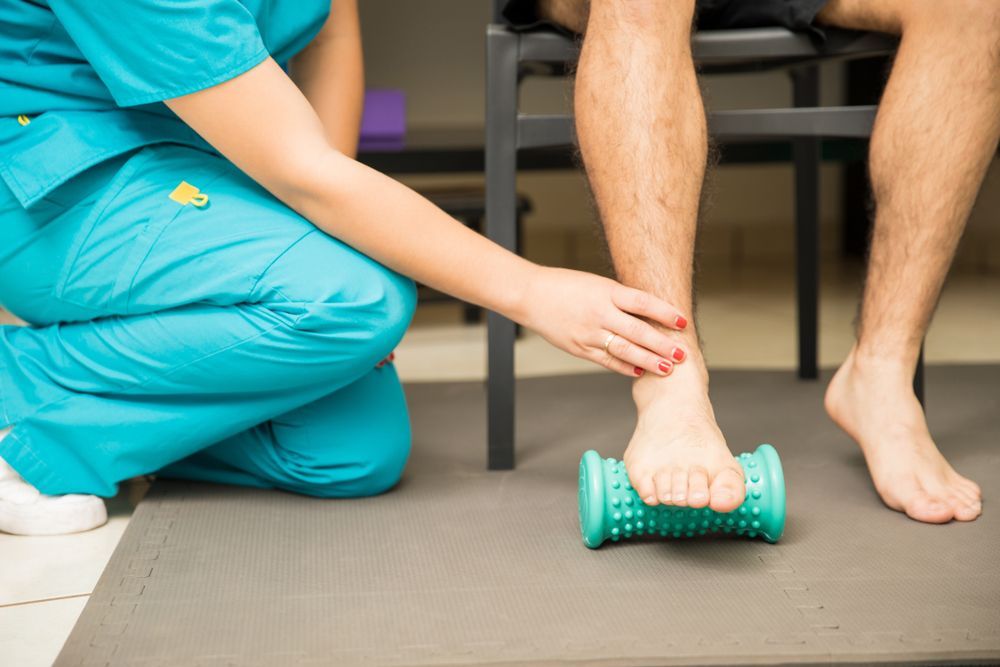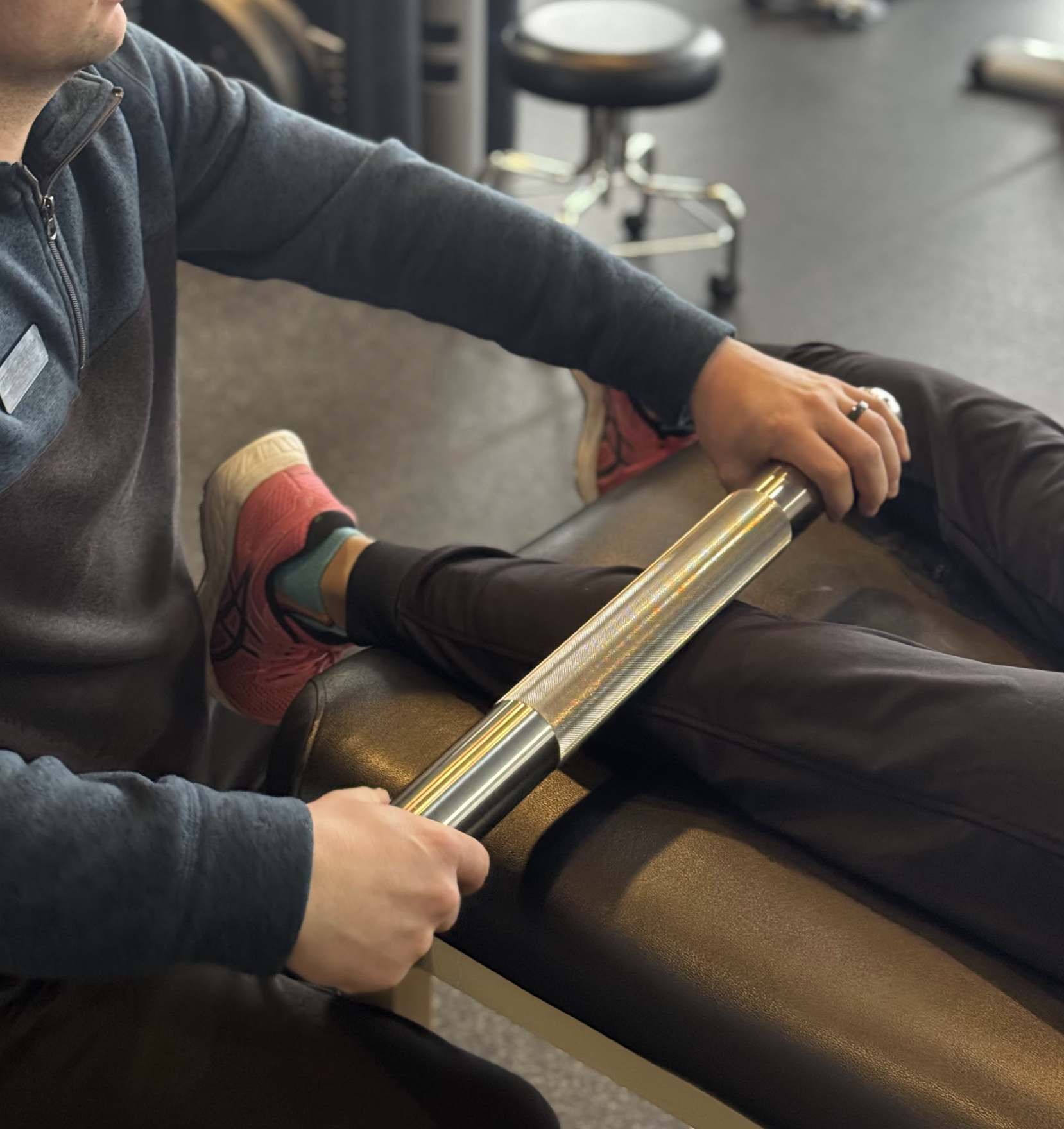Share this article:
Written by: Advanced Physical Medicine

Heel pain is incredibly common, particularly for people who work on their feet every day or who lead an active lifestyle. What many people do not realize, however, is that their heel pain may be the result of plantar fasciitis.
What is Plantar Fasciitis?
Plantar fasciitis is a common condition that occurs when connective tissue in the foot becomes inflamed. The plantar fascia is a thick band of tissue that connects the heel bone to the base of the toes, and it works to support the foot's natural arch. Essentially, you rely on your plantar fascia every time you stand or walk, which is why this critical tissue can become worn down or inflamed over time. Like many other connective tissues in the body, it can lose its elasticity, which is when plantar fasciitis occurs.
Common Symptoms of Plantar Fasciitis
Heel pain is the primary symptom of plantar fasciitis, but it is a gradual pain that will increase in strength and severity over time. According to Johns Hopkins Medicine, plantar fasciitis pain is often described as:
- A stabbing pain that begins at the bottom of the heel, and becomes gradually worse over time.
- A sudden pain that occurs near the heel when a step is missed or when landing a jump.
- An intense pain when you first get out of bed in the morning.
- A pain that intensifies when you are not wearing shoes, or you are walking barefoot.
What Causes Plantar Fasciitis to Flare Up?
Anyone is at risk of developing plantar fasciitis, particularly if they spend a lot of time on their feet. Those who are most at risk include:
- Athletes, particularly runners.
- Individuals who work on their feet all day.
- Individuals who are overweight.
Regardless of your risk factor, it's important to be aware of what causes plantar fasciitis to flare up. This condition typically becomes worse over time, and the pain will intensify if you do not take steps to treat it. Knowing the common causes of plantar fasciitis will help you make the best decisions for your health and well-being.
Overuse and Repetitive Stress
Overuse of the plantar fascia and repetitive stress on the foot is one of the leading causes of plantar fasciitis. This is one of the reasons why athletes and those who work on their feet are more prone to plantar fasciitis than others. In addition, starting a new exercise program can cause the condition to flare up, because the foot is not accustomed to the sudden and intense repetitive movement.
Improper Footwear
Improper footwear that does not support the natural arch of the foot can lead to unnecessary stress on the plantar fascia, which can lead to plantar fasciitis over time. By investing in high-quality shoes that support the natural arch of the foot, you can better protect your body and reduce the pain associated with plantar fasciitis.
Tight Calf Muscles and Achilles Tendon
If you begin a workout with tight calf muscles or a stiff achilles tendon, you may put additional stress on the plantar fascia which can lead to inflammation over time. Additionally, heavily worked muscles of the legs and calf will tighten up after a workout. The best way to avoid heel pain after a workout is to stretch your calf & foot muscles properly and thoroughly before and after.
Abnormal Foot Mechanics
Walking on uneven surfaces or surfaces without any buoyancy can lead to abnormal foot mechanics, which can damage your plantar fascia over time and lead to plantar fasciitis. It is important to wear supportive footwear and follow a structured exercise regimen in order to avoid abnormal foot mechanics that can compromise the health and integrity of your plantar fascia.
Weight Gain
Weight gain, whether sudden or over a longer period of time, can put additional stress on the foot and lead to plantar fasciitis. Individuals who are overweight may find that their foot begins to flatten out over time in order to accommodate the weight of the body, which forces the plantar fascia to pull away from the tendon, which can make plantar fasciitis particularly painful.
How to Treat Plantar Fasciitis
Regardless of the root cause of your plantar fasciitis, you will find that there are treatment options available to you. The most common treatment options for plantar fasciitis include:
Physical Therapy
Stretching is considered to be one of the best ways to treat plantar fasciitis and reduce flare ups in the future, but many individuals do not know which stretches to perform in order to treat their condition.

As a result, it is often best to work directly with a qualified physical therapist who can help you learn how to properly stretch your calf, foot and heel in order to improve your plantar fasciitis. Physical therapy is one of the most efficient and effective ways to treat plantar fasciitis.
Orthotics
Custom orthotics can be made in order to restore normal foot arch function and reduce inflammation in the foot. It is important to work closely with a specialist who understands foot pain and who can create effective custom orthotics that are rigid enough to maintain proper control yet flexible enough to accommodate natural foot functions.
Acupuncture
In addition to traditional treatment options, such as physical therapy and custom orthotics, individuals who suffer from plantar fasciitis can consider acupuncture as a supplemental treatment option. Acupuncture is a holistic treatment that relies on the strategic placement of small needles where they may stimulate nerves and connective tissues, such as the plantar fascia. When performed by a qualified specialist, acupuncture can be incredibly effective at reducing pain and inflammation.
Schedule Your Appointment Today
Advanced Physical Medicine of St. Charles strives to provide our clients with the personalized care that they need & deserve. We specialize in caring for patients who are suffering from foot and heel pain, and we can help reduce the pain associated with plantar fasciitis.
For more information about plantar fasciitis and treatment options that may be available to you, contact us to schedule your consultation appointment today.
Connect with Us:











